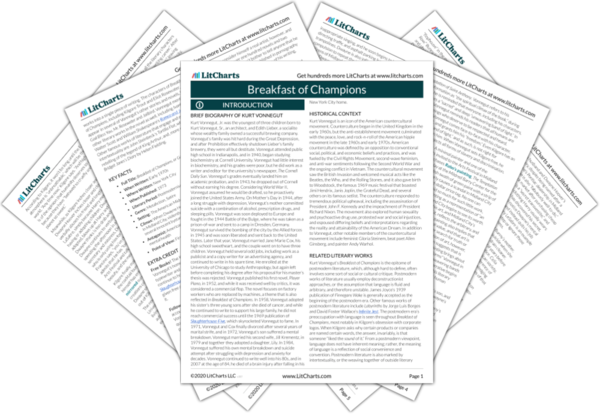Vonnegut repeatedly mentions mirrors in Breakfast of Champions, which represent a portal to another universe. Kilgore Trout refers to mirrors as “leaks” and likes to pretend that they are “holes between two universes,” which he often warns young children not to get to close to. Kilgore tells people that in Bermuda, where he comes from, the expression “I have to take a leak” means that one is “about to steal a mirror.” Kilgore tells this story to a truck driver, and a week later the man tells his wife, who then proceeds to tell all her friends. Kilgore’s story about taking a leak in Bermuda reflects his theory that ideas, good or bad, will eventually spread and permeate society.
Kilgore’s playful belief that mirrors represent holes between universes is also reflected throughout much of the book. Sugar Creek, the polluted stream that flows through the flatlands of Midland City, occasionally floods, and when it does, it “forms a vast mirror in which children might safely play.” In this instance, the mirror formed on the surface of Sugar Creek is a hole into another universe where the environment isn’t so badly polluted that dead fish float on the surface of streams and plastic waste hardens on the skin of anyone who dares to wade in the water.
Mirrors also cover the walls and surfaces in the lobby of the Holiday Inn when Kilgore first arrives. These “leaks” separate the cultured and sophisticated world of the Arts Festival and Kilgore’s blue-collar life as a storm window installer. Lastly, when Vonnegut himself goes to the Holiday Inn to watch the meeting between Kilgore and Dwayne Hoover, his own mirrored sunglasses are “leaks” that allow him to see out into the universe of his literary creation, but when his characters look at him, all they see is their own reflection.
Mirrors Quotes in Breakfast of Champions
There in the cocktail lounge, peering out through my leaks at a world of my own invention, I mouthed this word: schizophrenia.
The sound and appearance of the word had fascinated me for many years. It sounded and looked to me like a human being sneezing in a blizzard of soapflakes.
I did not and do not know for certain that I have that disease. This much I knew and know: I was making myself hideously uncomfortable by not narrowing my attention to details of life which were immediately important, and by refusing to believe what my neighbors believed.

Unlock explanations and citation info for this and every other Breakfast of Champions quote.
Plus so much more...
Get LitCharts A+









